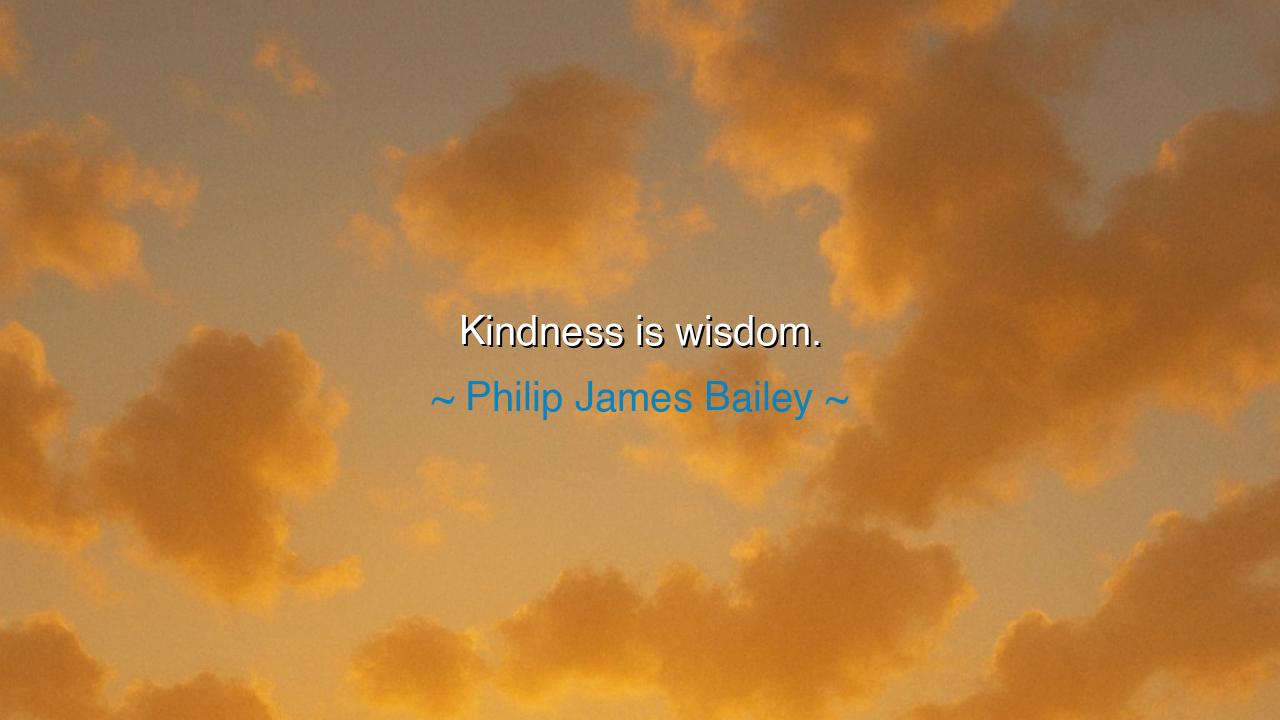
Kindness is wisdom.






Philip James Bailey, poet of the nineteenth century, uttered the simple yet eternal truth: “Kindness is wisdom.” In these three words lies a treasure greater than volumes of philosophy. For men may chase knowledge, power, and glory, but if they lack kindness, their wisdom is hollow, their triumphs are ash. True wisdom is not only to know what is right, but to act with gentleness, mercy, and love toward others.
To be kind is to see beyond the self. It is to understand the struggles of another, to ease burdens rather than increase them. Many equate wisdom with sharp intellect or clever strategy, yet the ancients knew better: the wise man is the one who builds peace where there is strife, who gives warmth where there is coldness. Thus, Bailey joins the chorus of sages in proclaiming that kindness itself is the highest form of wisdom.
History bears witness. When Abraham Lincoln ended the American Civil War, many urged him to punish the South with severity. Instead, he chose kindness, saying, “With malice toward none, with charity for all.” In doing so, he demonstrated not weakness, but a wisdom that sought healing rather than vengeance. His choice to temper victory with mercy left a legacy far greater than conquest alone could have given.
So too, consider Nelson Mandela, who emerged from decades of imprisonment not with bitterness, but with kindness toward those who had oppressed him. This act of mercy preserved South Africa from ruin and showed the world that true wisdom is not in retaliation, but in forgiveness. His kindness was not softness—it was strength, forged by suffering, and crowned with victory of the spirit.
O children of tomorrow, remember this teaching: intelligence may dazzle, cunning may triumph for a time, but only kindness builds bridges that endure across generations. To be wise is not to outwit your neighbor, but to uplift him. For in the end, the crown of wisdom is compassion, and the sword of the heart is mercy. Kindness is wisdom, and whoever walks in it shall not stumble.






DMDo Meme
I’m curious about the universality of this concept. Does kindness hold the same value as wisdom across different cultures, religions, or philosophical systems? How might this perspective influence legal systems, business ethics, or interpersonal relationships if it were taken seriously? It also makes me reflect personally—how often do I act with the kind of insight that aligns with this view, and how can I cultivate it more consistently?
AN31-Do Thi Anh Nhi-9E
It makes me question how we define intelligence and wisdom. Are cognitive abilities enough, or does true wisdom always require a moral dimension like kindness? This idea also challenges the traditional notion that success or intellect alone defines a capable person. Could a society that prioritizes kindness as wisdom foster more sustainable happiness and cooperation than one that prioritizes competitiveness or knowledge alone?
NTBich Ngoc Nguyen Thi
I feel both inspired and cautious considering this. While kindness seems like a clear moral good, can it ever be strategically applied in a way that demonstrates deep understanding of human nature? This raises questions about the intersection between ethics and pragmatism. How do we ensure that our kind actions are guided by insight rather than impulse or sentimentality?
VVVuong Vy
This perspective makes me think about leadership and decision-making. Could it be that the most effective leaders are those who combine strategic thinking with compassion? I also wonder if societies often underestimate the power of kindness in solving complex problems. Is there a practical way to measure or teach this type of wisdom, or is it inherently personal and situational?
D806 Dinh Thanh Dat 8/8
I find this idea intriguing but also challenging. Can someone be wise without being kind, or is kindness an essential component of true understanding? It also makes me question whether kindness always stems from wisdom, or if it can sometimes be naive or misguided. How do we distinguish between actions that are genuinely wise and those that are merely well-intentioned but potentially harmful?